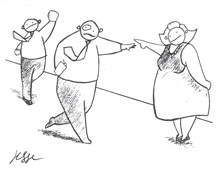
So, You’re in the Family Business… by Paul Karofsky
Stan: You know, Mom, Richard is really unfair. He gives me the worst jobs possible. He says I’m sloppy, and criticizes me in public, and he makes me look bad in front of everyone else.
Mom: I don’t know what to tell you, Stanley. He’s your brother. You’ve got to talk with him about it. I can’t keep interfering in your behalf. You’re not little boys anymore.
Stan: But he doesn’t listen to me when I talk to him. He just mocks me and nothing seems to change.
Mom reflects on the situation. “When I listen to Stan, my thoughts flash back twenty plus years to when my two little boys would fight over a bicycle, or a football, or which television program the two would watch. Stan would come to me, complaining about Richard, and Richard would deny that he did anything wrong and only get angrier at Stan and find a new opportunity to “take it out” on him. I felt so helpless and frustrated. I’d try to stand up for Stan. He was younger and smaller, kind of the ‘underdog.’ But I’m a mother with two sons. How can I take sides? Stan’s work is sloppy sometimes, maybe that’s why Richard gives him some of the less desirable jobs.”
Stan thinks about his anger and frustration with his brother and his disappointment that his mother won’t back him up. “I don’t know how to get through to Richard. He’s constantly beating on me and putting me down. I don’t think my work is that bad. And the worst is when he puts me down in front of other employees. Since Richard won’t listen to me, why won’t Mom help? I think he’d listen to her.”
What’s going on?
Whatever the issues between Stan and Richard, in Stan’s opinion, his brother is assigning him undesirable jobs, is overly critical, and embarrasses him in front of others. When confronted, Richard seems to be unresponsive. Stan sees himself as the victim, as helpless. His frustration and pain are significant and he sees his mother as his only refuge. While there may be legitimate business reasons for Richard’s behavior, they are apparently unknown by Stan. The company’s “chain of command” contributes to the predicament. Younger brother, Stan, taking assignments from older brother, Richard, summons up repeating patterns from childhood, consuming the relationship. Stan places himself at Mom’s mercy to once again save him from the abuse of his older brother.
Mom is trying to separate family and business and break the old patterns by directing Stan to communicate with his brother. But the past is too powerful for Stan. He has counted on Mom to “straighten things out” before and is now disappointed at her unwillingness to do so. Mom is in a squeeze. She recognizes that the caliber of Stan’s work is less than satisfactory, so standing up for Stan can compromise the company’s quality, yet if she does not support Stan, she disappoints her son at a time when he seeks her support.
What to do?
Stan must realize that no matter how unjust he believes his brother to be, mother is no longer the court of last resort. He must confront his brother directly, or be prepared to tolerate the current situation.
Likewise, if Richard has something to say about Stan, he should say it straight to him. To undermine his brother to other employees is to destroy both his brother’s and his own credibility. Richard must try to respect Stan’s concerns and be willing to listen with an open mind. In the absence of a more formal performance appraisal process, he can also make it clear to Stan that certain standards of quality are expected and must be achieved for the sake of the business.
Richard and Stan should seriously assess the advisability of their current reporting relationship. Whenever possible, siblings ought not “report” to siblings. When older and younger brothers’ behaviors from a generation past surface in the family business, they can devour and distort the business issues.
“Kudos” to Mom. She is wise to direct Stan to speak directly with his brother. This helps to minimize her chance of taking sides or resurfacing the patterns of childhood.
Mothers in a family business are typically charged with the role of “ceo” (chief emotional officer). This carries a special burden as well as an opportunity. Mothers are frequently counted on as the ones to achieve a sense of balance and fairness. They need to be on the lookout for childhood patterns of behavior and separate family and business issues. But for Mom and the business, administering a quick dose of guidance and direction can often be more valuable than trying to be the consummate problem solver herself.
Paul Karofsky was president of his family’s third generation business. He completed graduate studies at Harvard University doing research in family communication styles. Paul is Executive Director Emeritus of Northeastern University’s Center for Family Business and facilitates its Leadership Development Forum. He is the Founder and CEO of Transition Consulting Group, Ltd and is a frequent speaker and resource to educational institutions worldwide. Paul consults to family enterprises and can be reached at Paul@FamBizConsulting.com or 561-626-1110.
Copyright © 2010 Transition Consulting Group, Ltd. All rights reserved.
